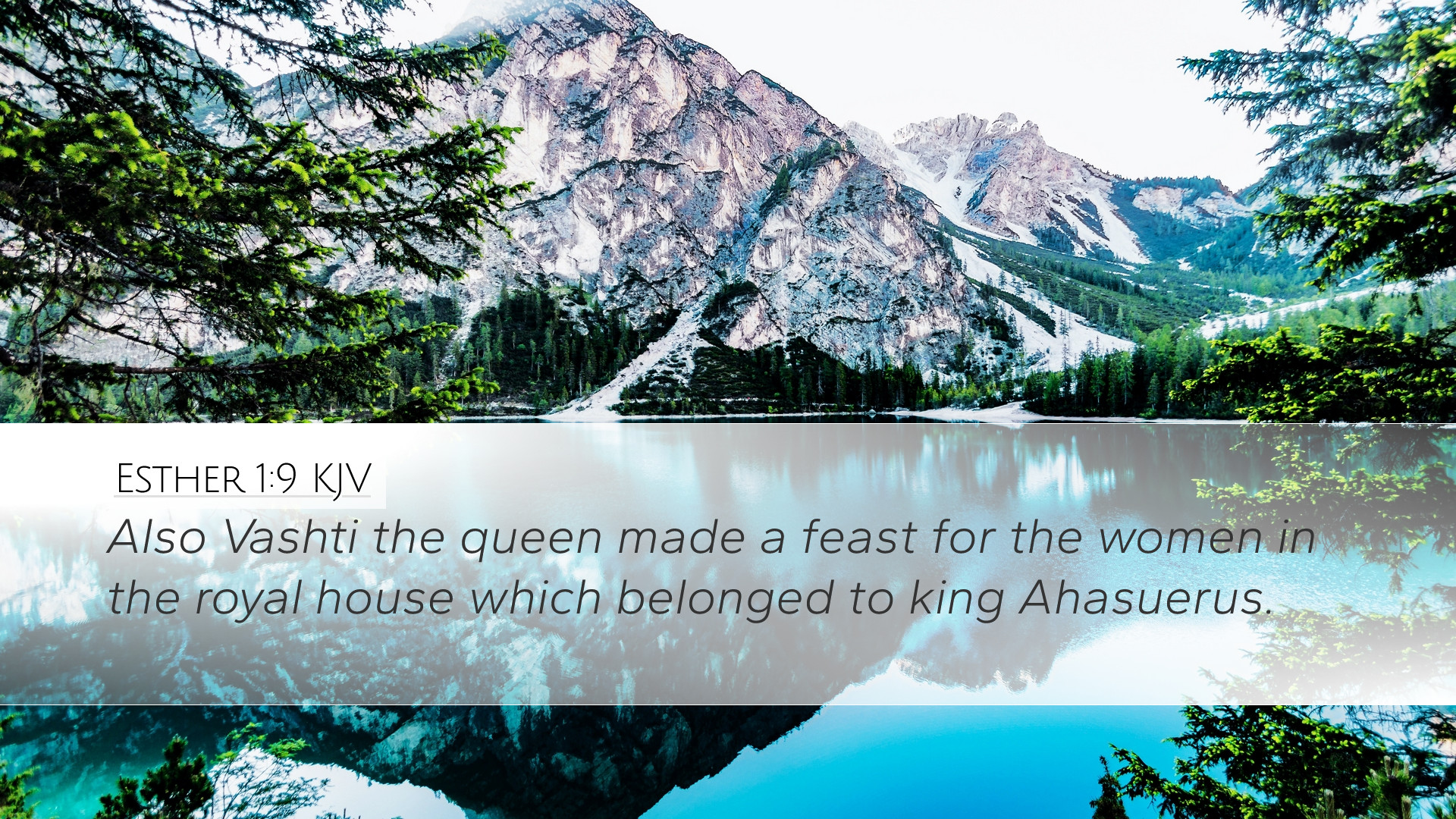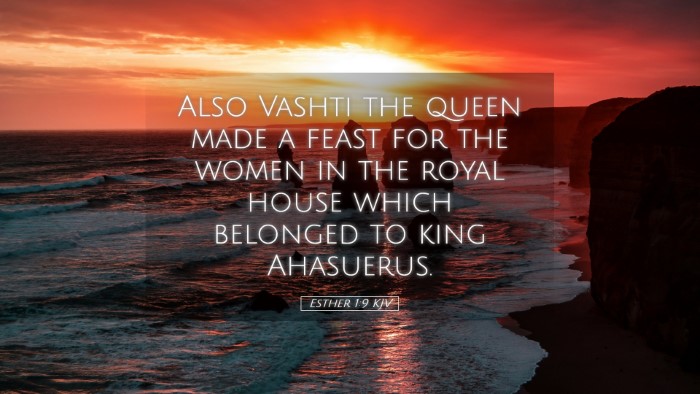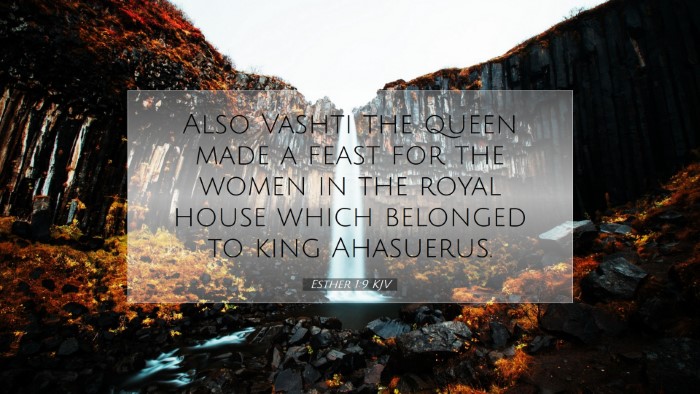Old Testament
Genesis Exodus Leviticus Numbers Deuteronomy Joshua Judges Ruth 1 Samuel 2 Samuel 1 Kings 2 Kings 1 Chronicles 2 Chronicles Ezra Nehemiah Esther Job Psalms Proverbs Ecclesiastes Song of Solomon Isaiah Jeremiah Lamentations Ezekiel Daniel Hosea Joel Amos Obadiah Jonah Micah Nahum Habakkuk Zephaniah Haggai Zechariah MalachiEsther 1:9
Esther 1:9 KJV
Also Vashti the queen made a feast for the women in the royal house which belonged to king Ahasuerus.
Esther 1:9 Bible Commentary
Commentary on Esther 1:9
Esther 1:9 states, “Queen Vashti also made a feast for the women in the royal palace which belonged to King Ahasuerus.” This verse, seemingly simple, unfolds several layers of cultural, theological, and moral implications worthy of deep exploration.
Contextual Background
This verse is pivotal in the introduction of the Book of Esther, a narrative that, while set in a foreign court, emphasizes the providence of God. Understanding the context of Esther's time—a period of Jewish exile and assimilation—sheds light on the significance of Queen Vashti’s actions.
Insights from Commentary
The commentaries of notable scholars such as Matthew Henry, Albert Barnes, and Adam Clarke provide profoundly insightful reflections on this verse.
Matthew Henry's Perspective
According to Matthew Henry, Vashti’s decision to host a banquet for the women stands as an assertion of her dignity and position. He observes that her feast contrasts sharply with the drunken revelry of the king’s banquet. This contrast highlights her moral fiber and virtue.
- Dignity of Women: Henry notes that Vashti's actions illustrated the respect and honor due to women, particularly in a patriarchal society that often marginalized them.
- Assertion of Agency: By hosting her own feast separate from the king’s, Vashti exhibits a form of independence—challenging the norms of her status as queen.
- Foreshadowing Events: This act of separation foreshadows the discord that will follow as Ahasuerus seeks to impose his will, leading to the eventual rise of Esther.
Albert Barnes' Insights
Albert Barnes focuses on the implications of Vashti’s feast within the royal palace, suggesting that it signifies a space of female solidarity. He emphasizes several points:
- Cultural Norms: Barnes highlights the cultural expectations during Ahasuerus’s reign that mandated women's subservience. Vashti’s act of hosting serves as a rebellion against these norms.
- Significance of Banquets: The feasts within the Bible often signify more than mere physical nourishment; they denote relationships, power dynamics, and social status.
- Symbol of Change: The splintering of the queen’s social function from that of the king embodies the impending social changes that their actions will bring about in the narrative.
Adam Clarke's Commentary
Turning to Adam Clarke, we find a more literary critique of the text. Clarke posits that Vashti’s choice to entertain the women may also serve as an expression of unity and resistance to the demeaning treatment of women in that era.
- Resistance Against Objectification: Clarke interprets Vashti's feast as an important stand against the objectification present in the king’s desire to display her beauty to his guests.
- Women’s Agency: He emphasizes that Vashti plays a crucial role in establishing a narrative where women, albeit within constrained circumstances, have agency.
- Theological Reflections: Clarke urges readers to reflect on the role of divine providence; Vashti's defiance sets the stage for God’s deliverance of His people through Esther.
Theological Themes
The verse and its related commentaries introduce several theological themes crucial for understanding God’s providence in human affairs.
- The Nature of Authority: The power dynamics between Ahasuerus and Vashti reflect broader themes concerning authority and submission, challenging modern readers to discern their own contexts.
- Divine Providence: While Vashti’s actions appear to disrupt the king’s desires, they catalyze a series of events leading to Esther's rise and eventual saving of the Jewish people—an evidence of God's hidden hand in history.
- Women's Roles in Redemption: The narrative invites reflection on the often-overlooked roles women play in Scripture and how such actions contribute to God's overarching plan of redemption.
Lessons for Contemporary Readers
For pastors, students, theologians, and Bible scholars alike, Esther 1:9 serves as a reminder of the complexity of human relationships and the critical roles women have historically played in the unfolding of God’s redemptive story.
- Embrace of Women’s Dignity: Recognizing and affirming the dignity and agency of women in biblical narratives can empower today’s church to foster genuine community.
- Awareness of Cultural Norms: Understanding historical attitudes toward gender helps to inform contemporary discussions about equality and justice within ecclesiastical settings.
- Faithfulness in Adversity: Vashti’s stand against unreasonable demands serves as a significant lesson in standing firm in one's convictions, even at great personal cost.
Conclusion
Esther 1:9 is a richly layered verse that, while it might initially appear mundane, reveals the complexities of royal life, cultural expectations, and the divine orchestration of events that shape the history of God's people. Through the eyes of various biblical commentators, the character of Queen Vashti emerges as a figure of strength and resistance, laying the groundwork for God’s ultimate intervention through Esther. As we engage with this narrative, we are invited to reflect not only on the text itself but on our own responses to the issues of authority, dignity, and the call to act righteously in the face of cultural pressures.


